It’s a grave cold night in a city that knows how to keep its secrets. Alleys fill with mist. A flashlight casts a ghostly glow in a back office of a supposedly-deserted government building. Figures with obscured faces meet in the shadows of a parking garage. This file doesn’t exist, and I’m certainly not handing it to you now. In fact, this building won’t be here tomorrow. Besides—who’s to say you haven’t dreamed this entire conversation?
Two great truth-seekers arose from twentieth-century fiction: the noir detective and the spy. They live in similar worlds: murky and high-contrast, full of suspicion and distrust, peeling back the skin of consensus reality to reveal the worms beneath. The spy and detective have their differences, though. Most of the time, you can trust the detective. She’s here to right wrongs, to find murderers and bring them to justice, or at least try. The spy’s motives are murkier. It’s unclear whether she’s out to save anyone except herself.
The detective believes in right—she believes she can make a difference, no matter how small. The spy has seen the other side. The spy knows that good’s the word on the survivor’s tongue. She’s sacrificed her last inch of hope; she’s seen the darkness, and knows its name.
But while detectives and the world of science fiction and fantasy are on intimate terms—the genre’s full of PIs guiding readers through fantastic realms, seeking truths and dispensing the occasional wisecrack—the fantastical spy’s a rarer being. When she surfaces, she leaves an impression before she disappears into the night.
Writing The Witch Who Came in from the Cold, we drew on a rich tradition of weird spies from a range of media, but here are a few books you might seek out if you’re looking to check our sources.
Declare by Tim Powers
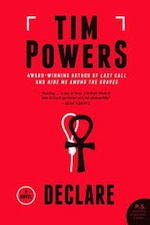 The less known about a Tim Powers novel going in, the better, so may I suggest stopping now and reading this book if you haven’t already? Declare is a tale of twentieth century weirdness that follows a world of secret knowledge struggling to reinvent itself in the face of deeper and more secret knowledge. Catching hosts of strange-but-true details of history in the net of its plot, Declare melds the plausibly deniable symbolism and grandiose, grotesque schemes of magic and espionage.
The less known about a Tim Powers novel going in, the better, so may I suggest stopping now and reading this book if you haven’t already? Declare is a tale of twentieth century weirdness that follows a world of secret knowledge struggling to reinvent itself in the face of deeper and more secret knowledge. Catching hosts of strange-but-true details of history in the net of its plot, Declare melds the plausibly deniable symbolism and grandiose, grotesque schemes of magic and espionage.
The Laundry Files by Charles Stross
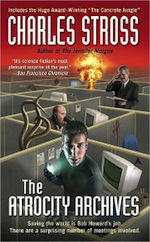 Charles Stross’ Laundry Files confront the worlds of magic and covert espionage with the less mysterious, but far more opaque, soul-sucking domain of civil service bureaucracy. Here the spies and monsters are both on the table, unpacked with excellent humor and set off against slide decks, action items, matrix management, and obscure data filing systems. Declare and The Laundry Files both start from the LeCarre premise that spies, mystical or otherwise, are part of an organization—but Declare supposes the organization in question is competent, while the Laundry Files suppose that it looks a lot more like the kind of organizations we all encounter in daily life. Which only adds to the horror.
Charles Stross’ Laundry Files confront the worlds of magic and covert espionage with the less mysterious, but far more opaque, soul-sucking domain of civil service bureaucracy. Here the spies and monsters are both on the table, unpacked with excellent humor and set off against slide decks, action items, matrix management, and obscure data filing systems. Declare and The Laundry Files both start from the LeCarre premise that spies, mystical or otherwise, are part of an organization—but Declare supposes the organization in question is competent, while the Laundry Files suppose that it looks a lot more like the kind of organizations we all encounter in daily life. Which only adds to the horror.
The Miles Vorkosigan books by Lois McMaster Bujold
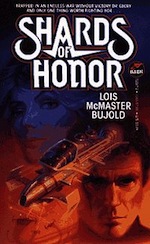 Bujold’s brilliant science fictional Ruritanias enable some of my favorite intrigue in genre. Miles Naismith Vorkosigan, Bujold’s hero, has a weak body but a brilliant mind—too brilliant for his own good, in fact. Miles’ fast footwork leads him into mission after mission for Barrayaran intelligence, as a highly placed secret agent-cum-interstellar mercenary admiral. It all makes sense, and trust me, if you don’t know these books already, you’re in for a hell of a ride. Start at the beginning with The Warrior’s Apprentice, or, really, with any of her books. Bujold deserves all the praise she receives, but there’s one talent of hers I never appreciated until I was six books into writing my own series: she’s one of the best on-boarders in the business.
Bujold’s brilliant science fictional Ruritanias enable some of my favorite intrigue in genre. Miles Naismith Vorkosigan, Bujold’s hero, has a weak body but a brilliant mind—too brilliant for his own good, in fact. Miles’ fast footwork leads him into mission after mission for Barrayaran intelligence, as a highly placed secret agent-cum-interstellar mercenary admiral. It all makes sense, and trust me, if you don’t know these books already, you’re in for a hell of a ride. Start at the beginning with The Warrior’s Apprentice, or, really, with any of her books. Bujold deserves all the praise she receives, but there’s one talent of hers I never appreciated until I was six books into writing my own series: she’s one of the best on-boarders in the business.
The Lymond Chronicles by Dorothy Dunnett
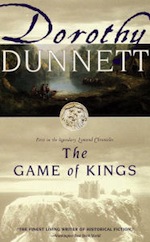 The past’s not just another country, it’s a whole damn other world. Dorothy Dunnett’s hero, Francis Crawford of Lymond, spends much of his titular series as a sort of freelance intelligence agent, frequently in Scotland’s service, but often in the service of Scotland’s greater interests regardless of whatever Scotland’s current government might have to say about the subject. Lymond swings between professions—fugitive, mercenary captain, nation-builder—but he’s always a bit of a spy. It’s a stretch including him on this list, but historical fiction taken this seriously has as much world building as any work of fantasy or science fiction—and once you add in the peculiarities of Lymond’s world (the separate order of geniuses to which he and a few select other characters belong, the Dame de Doubtance, etc.), we’re practically in another universe altogether.
The past’s not just another country, it’s a whole damn other world. Dorothy Dunnett’s hero, Francis Crawford of Lymond, spends much of his titular series as a sort of freelance intelligence agent, frequently in Scotland’s service, but often in the service of Scotland’s greater interests regardless of whatever Scotland’s current government might have to say about the subject. Lymond swings between professions—fugitive, mercenary captain, nation-builder—but he’s always a bit of a spy. It’s a stretch including him on this list, but historical fiction taken this seriously has as much world building as any work of fantasy or science fiction—and once you add in the peculiarities of Lymond’s world (the separate order of geniuses to which he and a few select other characters belong, the Dame de Doubtance, etc.), we’re practically in another universe altogether.
Stations of the Tide by Michael Swanwick
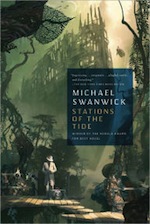 Like the characters at its core, Swanwick’s novel transforms before the reader’s eyes. Is it a detective story masquerading as a spy story? Vice versa? Does it start as one and become the other? Is it a story of magic, or religion, or science, or all of these at once? Hidden agendas are plumbed; power is used sparingly, viciously, unfairly; secrets are revealed and concealed, and the world changes.
Like the characters at its core, Swanwick’s novel transforms before the reader’s eyes. Is it a detective story masquerading as a spy story? Vice versa? Does it start as one and become the other? Is it a story of magic, or religion, or science, or all of these at once? Hidden agendas are plumbed; power is used sparingly, viciously, unfairly; secrets are revealed and concealed, and the world changes.
One of the authors of the new series The Witch Who Came in From the Cold, which starts January 27th at Serial Box, Max Gladstone has been thrown from a horse in Mongolia, drank almond milk with monks on Wudang Shan, and wrecked a bicycle in Angkor Wat. Max is also the author of the Craft Sequence of books about undead gods and skeletal law wizards—Full Fathom Five, Three Parts Dead, Two Serpents Rise, and Last First Snow. Max fools everyone by actually writing novels in the coffee shops of Davis Square in Somerville, MA. His dreams are much nicer than you’d expect.










wow. so I just added 5 more books to my TBR list.. I couldn’t help myself after that intro. also need to check out Mr. Gladstone’s books.. I have one somewhere in my Kindle already, I think.
I will delve deep into my past and suggest the Lord Darcy series by Randall Garrett published in the 1960’s. Darcy is a detective in an alternate history world that is vaguely Victorian; the Watson to his Holmes is Sean O Lochlainn, a forensic sorcerer. The several novels (written by Garrett and, after his death, by Michael Kurland, pay stylistic homage to famous detective writers such as Rex Stout, Agatha Cristie, and Conan Doyle.
https://en.wikipedia.org/wiki/Lord_Darcy_(character)
Amanda Downum’s Necromancer Chronicles (Drowning City et al.) definitely need to be part of this list as well.
One of my favourites is Poul Anderson’s Dominic Flandry, Agent of the Terran Empire; a spy who knows that his civilization is decadent and decaying but still tries to stave off collapse so that the coming Long Night will be kinder to humanity. It’s mostly fun pulp space opera, similar in some ways to James Bond (though Flandry appeared first) until REDACTED happens in REDACTED.
A minor note: volumes of Stross’s Laundry series have been patterned after Len Deighton, Ian Fleming, Anthony Price and Peter O’Donnell but there hasn’t been and won’t be a John le Carré style Laundry book.
Technically, a lot of the Culture books by Iain M. Banks are about weird spies, and not just in that the universe is a fantastical SF adventure, but because the operatives themselves are often not the usual mold… you get bored game players, competent hedonists, crazy robots, musicians, and more.
I’m surprised no one has yet mentioned The Rook by Daniel O’Malley. The heroine works for a secret British organization dealing with all manner of weird supernatural occurrences. There’s plenty of paranoia as she is dealing with amnesia, guided by letters she wrote to herself.
How about some classic Frank Herbert – Whipping Star and Dosadi Experiment featuring superspy Jorj McKie of the Bureau of Sabotage? Very weird and fun (especially Dosadi).
I think my favorite thing about Cryptonomicon is all the seemingly covert spy missions that are really just misdirection and exercises in information theory. Not sure that quite qualifies for a list like this but it works for me.
I hope that Mike Martinez’s Majestic-12 series starting this year will be a worthy addition to your list!
Turtledove wrote a few AH stories about a weird alt-byzantium spy tangling with the still extant Persian Empire.
And Modesitt has a few SF spies in his future worlds, too
Hmmm. I could swear I’ve heard of a WWII/Cold War series called The Milkweed Triptych, in which spies and the occult feature quite heavily…
Ditto on The Rook. I have the sequel on order, but without the letters to herself, I bet it isn’t as fun as the first book.
My favorite author is Bujold. I don’t categorize Miles primarily as a secret agent, although in several books that’s what he is. Her books are good in a myriad of ways.
Funny that the site used Shards of Honor for the Bujold/Miles books where (1) no Miles and (2) no spies (as I recall).
Re Miles as a spy, I think of Cetaganda (kind of), Vor Game (definitely), Borders of Infinity (novella), and Labyrinth (novella), Of course, he is also spymaster to field agent Eli Quinn in Ethan of Athos and is acting effectively as a counterintelligence investigator in both Memory and Komarr.
@6 & 11. Yes..I was thinking of “The Rook” the whole time reading this article. :)
Declare is terrific, and Powers’ best work (unfortunately I read it first and so none of the others have been quite as good!). His Three Days to Never also involves weird spies (remote viewers, Mossad paranormal operators). The Laundry novels follow a Dune-style decay curve; the first one is a near-classic and each subsequent one is roughly 2/3 as good as its predecessor. I can actually track this by looking at my bookshelf and seeing what format I bought them in. It’s hardback first edition – hardback – paperback – secondhand paperback – borrowed from the library – borrowed from the library but didn’t bother finishing.
Thanks for the Lymond recommendation – never come across those before!
My english failes me here what does “she’s one of the best on-boarders” about Bujold mean?
Troy: It means she’s good at getting you on board, when you start in the middle of the series.
@15 – you can pick any book in the 15 book series and quickly understand what is going on with the characters, events and history.
Thanks!
Let us not forget the inimitable Phedre no Delaunay de Montreve, Servant of Naamah and sometime-avatar of Kushiel. She was trained as a superlative spy, although she began as a novice in the Court of Night-Blooming Flowers, the series term for professional courtesans. Phedre often ends up a playing piece of the gods, altering politics and history, although she would prefer a much quieter life.
I am really surprised that Michael Moorcocks’ Jerry Cornelius Quartet did not make this list.
While Lawrence Block is better known for his mystery novels, he wrote a series about The Thief Who Couldn’t Sleep, whose main character has the advantage of having at least 8 extra hours in his day to commit his capers, during which he gets caught up in cold war spy games and ends up working for an unnamed shadow branch of the US govt. Nominally sci-fi, definitely entertaining.
What about some Christopher Stasheff “Warlock in Spite of Himself” and all of the ones about his son as well. For detective mystery I always enjoy Garrett P.I. from Glen Cook.
“Citizen of the Galaxy” by Heinlein. About the best & most urgently needed spy in the Solar System, told from the point of view of his young teen son, who only gradually figures out what’s going on.
No mention of Brian Lumley’s Necroscope series?
@@@@@ 7 Rob
yes thanks for telling about F HERBERT ‘other books than Dune. I just reread these two ( Whipping Star and Dosadi Experiment) every now and then
i will try the Max Gladstone book I really love his Craft sequence …